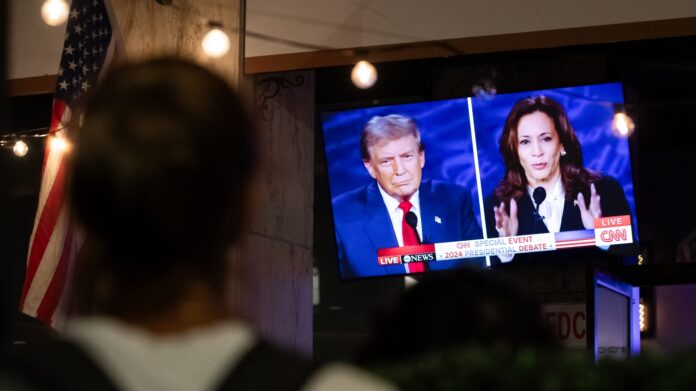
A person stops to watch a screen in Washington, D.C., displaying the presidential debate between Vice President Harris and former President Donald Trump in September.
Allison Bailey/AFP via Getty Images
hide caption
toggle caption
Allison Bailey/AFP via Getty Images
The future of voting rights in the U.S. is on this fall’s ballot with the two major party candidates for president offering two starkly different paths.
Vice President Harris, the Democratic nominee, is calling for strengthening legal protections against racial discrimination in the election process and making it easier for eligible voters to cast ballots.
Former President Donald Trump, on the other hand, is pushing for more restrictions to voting access that would likely disproportionately affect voters of color. The Republican nominee — who has refused to commit to accepting this year’s election results without conditions, while facing four felony counts connected to efforts to overturn the 2020 results and disenfranchise millions of voters — has also been fueling concerns about the rare and illegal practice of non-U.S. citizens voting in federal elections.
Winning the White House, however, won’t necessarily be enough for either candidate to turn their policy goals into reality. Which party controls the next Congress and whether the courts will weigh in are also key factors.
Still, here’s what each candidate’s platform says voting rights could look like under their administration:
Harris
Noting that the “freedom to vote” is at stake in this election, Harris’ platform says her administration would support the passing of two voting rights bills that haven’t been able to garner enough Senate support during the Biden administration.
A key provision of the John Lewis Voting Rights Advancement Act, named in honor of the late civil rights icon, would bring back requirements for certain states and counties with a history of racial discrimination to get “preclearance” approval from the Justice Department or a federal court before changing their rules for elections. In 2013, the Supreme Court’s conservative majority effectively dismantled those protections, which made up a key part of the landmark Voting Rights Act of 1965.
Core parts of the Freedom to Vote Act would require states to allow all eligible voters to vote by mail for federal elections with no excuse needed and set nationwide minimum requirements for an early voting period for every federal election.
For years, Harris has signaled voting rights is a top policy priority. While serving in the Senate, she co-sponsored earlier versions of the Lewis act, as well as the Native American Voting Rights Act, and introduced a bill that would have expanded voting by mail and early in-person voting for the pandemic election of 2020.
“I cannot wait to cast the deciding vote to break the filibuster on voting rights,” Harris said at a 2022 Democratic National Committee meeting, referring to her current role as president of the Senate, which allows her to cast any tie-breaking vote needed to eliminate the 60-vote requirement for advancing legislation.
Trump
Among the 20 promises Trump’s platform says his second term would accomplish “very quickly” if Republicans control the next Congress are references to voting-related measures that either are already in place or would restrict voting access.
In order to “secure” elections, the platform highlights paper ballots, which are the current norm in U.S. elections. Around 98% of votes in this year’s general election will be cast on paper, the Brennan Center for Justice at the New York University School of Law estimates.
Trump also calls for “same day voting,” a variation of his preference for “one-day voting” over mail-in voting. For years, the former president, who has cast mail ballots himself, has spread baseless claims of widespread fraud involving this voting method, which has been used since the Civil War to ensure military service members who are eligible to vote have access to the ballot box. Restricting voting in an election to one day would likely also prevent many civilian voters from casting ballots.
Providing proof of citizenship when registering to vote in federal elections and showing identification before casting a ballot are two other key proposals from Trump’s platform.
U.S. citizenship is required for voter registration in federal elections, and most states use applicants’ Social Security or driver’s license numbers to check for citizenship information in government agency databases. Eligible voters who register with the national voter registration application, which federal law requires states to accept, are asked to swear under penalty of perjury that they are U.S. citizens, with imprisonment or deportation as possible punishment.
About 1 in 10 adult citizens say they either do not have, or could not quickly find in order to show the next day, a document that proves their U.S. citizenship, with citizens of color more likely to say so than white citizens who do not identify as Latino, according to a recent national survey.
Still, Trump has been a major backer of the Safeguard American Voter Eligibility Act, which would require proof of citizenship when registering to vote in federal elections. In September, he called for a federal government shutdown unless Congress passed “every ounce of” the SAVE Act — a move that lawmakers ultimately avoided.
Providing some type of ID at the polls is already requested or required of voters in 36 states, according to the National Conference of State Legislatures. Surveys have found voter ID proposals to be popular, but studies show that cases of a person impersonating a voter at the polls are extremely rare and voter ID requirements are likely to disproportionately prevent registered Black and Latinx voters from casting ballots.
Edited by Benjamin Swasey






